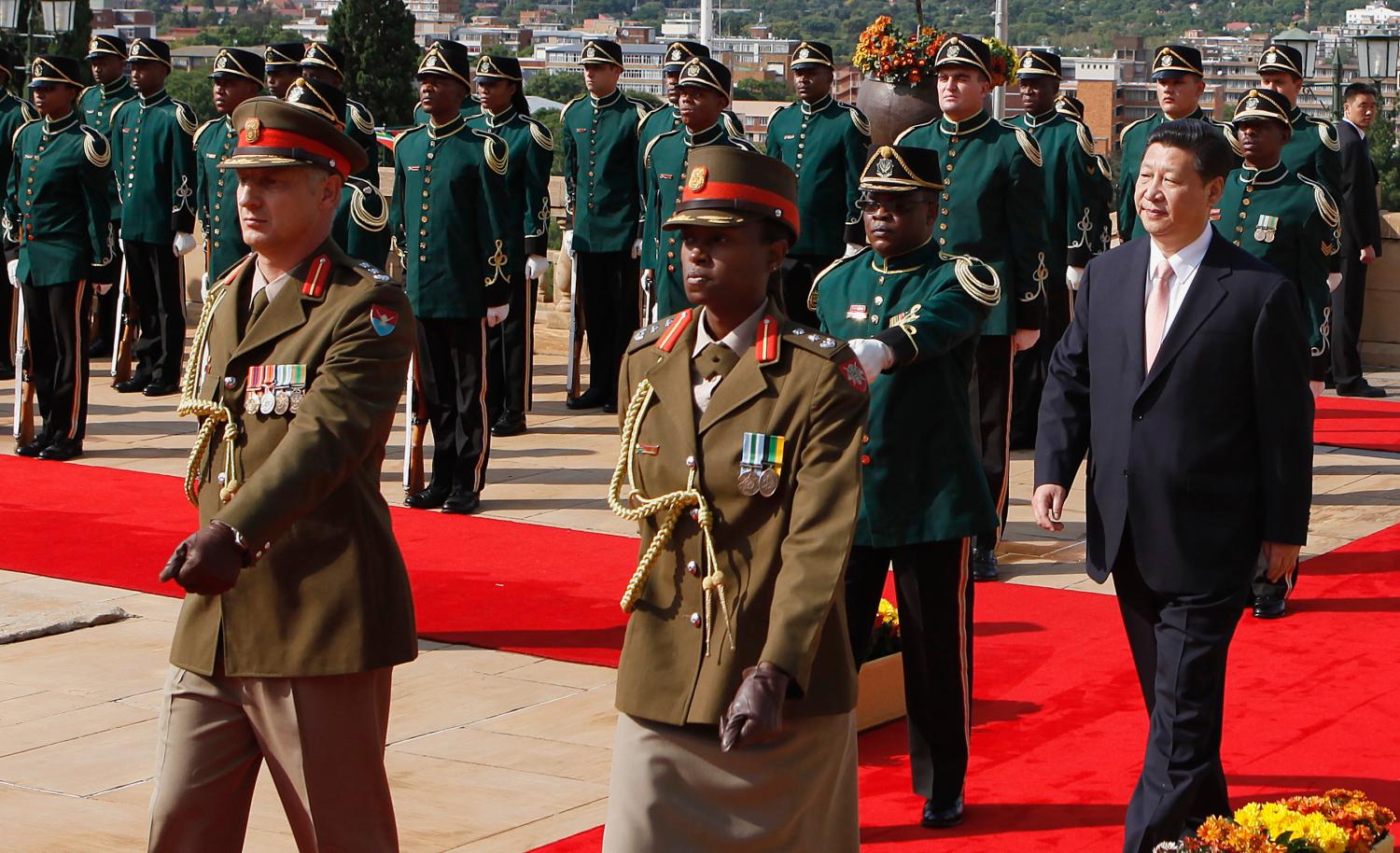The increasing role of China in Africa may have some negative consequences for the African people with China’s “no strings attached” approach to investment and foreign assistance to the region. Yun Sun outlines areas for increased cooperation between the U.S., China and African countries in order to advance common goals.
This chapter is part of Top Five Reasons Why Africa Should Be a Priority for the United States. Read the full report here and tell us why you think Africa matters to the U.S. Join the conversation on Twitter using #AfricaMatters.
The Priority
China is an increasingly important player in the politics, economic development and security of Africa. Historically, China has prioritized strong diplomatic relations and political ties with African states with an ideological aspiration anchored on the “solidarity among the Third World countries.”[1] However, since 2001, China’s pursuit in the continent has rapidly expanded into the economic arena, focusing on Africa’s rich natural resources to fuel China’s domestic economic growth.
China’s growing economic presence in Africa is hardly altruistic and is guided by the principle of “mutual benefits” to both sides. Under the framework of “resources for development,” Beijing mobilizes its vast state financial resources to invest broadly in infrastructure projects across Africa and extract natural resources in return. Moreover, these investments generate multiple layers of benefits for China, including contracts for Chinese service companies, the relocation of labor-intensive, heavy-pollution industries from China, political favors extracted from African governments on foreign policy issues at multilateral forums such as the United Nations, and a positive international image of China being a “responsible stakeholder.” These motivations are particularly true in explaining China’s interests in resource-poor African countries.
This strategy most likely will continue in the foreseeable future. In July 2012, China doubled its 2009 commitment to provide $20 billion in financing to Africa to further its strategic blueprint in the next three years.[2] The contemporary analysis of China’s role in Africa is dramatically split. Dragon-slayers emphasize China’s selfish quest for Africa’s natural resources and how it sabotages international efforts to keep unpalatable African regimes in check. On the other hand, panda-huggers applaud China’s contribution to Africa’s economic development through infrastructure projects and revenue creation. Neither reflects the nuanced, complicated nature of what China means for Africa. China enjoys unique financial and political advantages in promoting Africa’s growth but neglects the governance, fairness and sustainability of such development. Therefore, the short-term benefit China provides to Africa is intrinsically flawed and has long-term negative consequences.
Meanwhile, along with China’s enhanced role in Africa is the reality that the U.S. is being increasingly edged out of the continent politically and economically. To compete with the Chinese presence and to counter the negative consequences of China’s approach, the U.S. must become more engaged in Africa with effective strategies. China’s unique approach also has tremendous implications for the U.S. role in global governance and the future of its African partners.
Why is it Important for the U.S.?
China’s approach to Africa represents a fundamental challenge to U.S. interests in promoting democracy, good governance and sustainable development in Africa. Chinese funding flows to Africa with “no strings attached,” such as requirements on transparency, anti-corruption, environmental protection, human players in Africa exacerbate the problems through their active endorsement and participation in the flawed process. Therefore, Beijing offers an easy alternative to the principled or disciplined development assistance from the West and multilateral financial institutions, and undercuts the latter’s effort to address the systematic and institutional deficiencies of African countries and to promote long-term sustainable development and democratic systems.
Furthermore, China’s engagement in Africa has profound geopolitical implications for the U.S. global strategy. As the U.S. rebalances to the Asia-Pacific region, China has identified increasing hindrances in its strategic advancement in East Asia and the Pacific. In response, China is shifting its attention westward to South Asia, the Middle East and Africa to expand arenas for its political and strategic influence. These areas are seen as the most promising by Beijing given the stagnant or declining U.S. involvement. Especially in Africa, China is looking beyond the traditional pursuit of economic benefits and aspires to increase and solidify its strategic presence through enhanced political, economic, diplomatic and academic resources. The failure to perceive and prepare for China’s moves would be dangerous, unwise and potentially detrimental for the United States in the near future.
The Opportunity for the U.S.
Given China’s involvement in Africa, there is an even greater need for the U.S. to engage and cooperate with China for its own national interests and global agenda, such as security and governance. Not engaging China in Africa could undercut and even nullify U.S. objectives given China’s approach. Cooperation on security issues, like South Sudan, most likely will not excite China in that China believes the U.S. might ask Beijing to carry a disproportionate share of economic and political responsibility. Furthermore, China worries that a U.S.-China/G-2 approach to African security issues might alienate China’s traditional friendship with African countries since China prefers bilateral or multilateral approaches.
Meanwhile, there are key issues on which the U.S. could and should focus. The U.S. needs to raise its concerns and request that China adjust its investment and assistance policies toward Africa through the Africa consultation under the U.S.-China Strategic and Economic Dialogue. The U.S. needs to better coordinate with China on providing aid, technology and technical support in the fields of health care, and medical and agricultural assistance. Furthermore, inside Africa, the U.S. needs to mobilize its political, diplomatic and soft power influences to mitigate the negative impact of the mercantilist approach of China. Last but not least, a conscious educational effort should be made to help Africa achieve the long-term vision about the consequences of China’s myopic development model.
Endnotes
[1] “Hu Jintao visit eight African countries and deepened friendship with the African continent”, [胡锦涛访问非洲八国 深入非洲大陆友谊之旅], Xinhua News Agency, Feb 10, 2007
[2] Jane Perlez, “With $20 Billion Loan Pledge, China Strengthens Its Ties to African Nations”, New York Times, July 19, 2012
The Brookings Institution is committed to quality, independence, and impact.
We are supported by a diverse array of funders. In line with our values and policies, each Brookings publication represents the sole views of its author(s).




